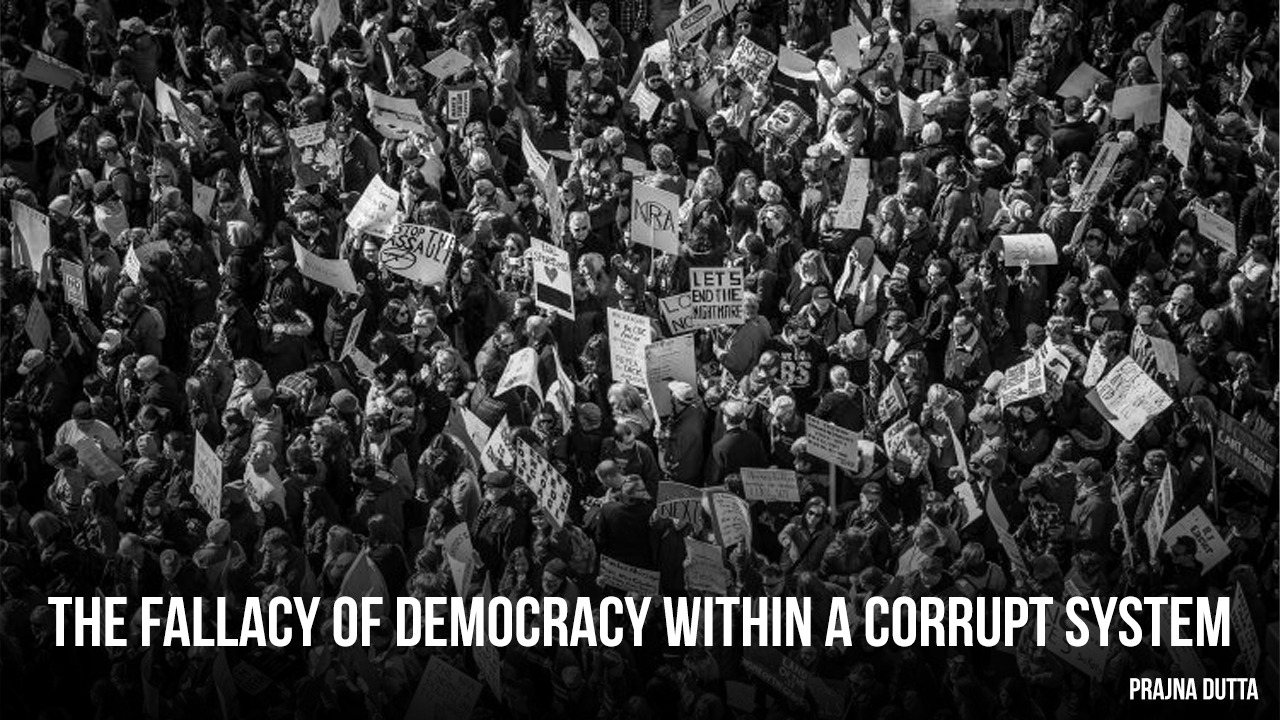Introduction
Democracy, often heralded as the epitome of political systems, is founded on the principles of equality, representation, and the will of the people. However, when democracy is ensconced within a corrupt system, its very essence and effectiveness can be compromised. This article delves into the fallacy of democracy within a corrupt system, examining the challenges and implications that arise when the principles of democracy clash with systemic corruption.
Understanding Democracy and Corruption
Democracy is a system of government where power is vested in the hands of the people, either directly or through elected representatives. It emphasizes the importance of political participation, accountability, and the protection of individual rights. On the other hand, corruption refers to the abuse of power for personal gain, often at the expense of public welfare and the rule of law. Corruption undermines the principles of transparency, accountability, and fairness that are essential for a functioning democracy.
The Fallacy of Democracy in a Corrupt System
When democracy operates within a corrupt system, several critical issues arise that erode its efficacy and legitimacy:
1. Erosion of Trust: Corruption breeds cynicism and distrust among citizens, leading to a lack of faith in democratic institutions and processes. When public officials engage in corrupt practices, it undermines the credibility of the entire system, making it difficult for citizens to believe in the fairness and integrity of elections and decision-making processes.
2. Manipulation of Elections: In a corrupt system, elections may be manipulated through bribery, coercion, or fraud to ensure that those in power remain in power. This undermines the fundamental principle of free and fair elections, depriving citizens of their right to choose their representatives and hold them accountable.
3. Capture of Institutions: Corruption can lead to the capture of key institutions, such as the judiciary, law enforcement, and regulatory agencies, by powerful individuals or interest groups. When these institutions are compromised, they fail to fulfill their roles as checks and balances on government power, allowing corruption to flourish unchecked.
4. Inequality and Exclusion: Corruption perpetuates inequality by diverting resources away from essential services and public goods towards the pockets of the corrupt elite. This exacerbates social and economic disparities, marginalizing vulnerable populations and undermining the principle of equal representation in a democracy.
5. Loss of Public Interest: In a corrupt system, decisions are often made to benefit the few at the expense of the many. Public policies may be distorted to serve the interests of corrupt officials and their cronies, rather than addressing the needs and priorities of the broader population. This leads to a loss of public interest and engagement in the democratic process.
Addressing the Fallacy: Ways to Strengthen Democracy in the Face of Corruption
While the challenges posed by the fallacy of democracy within a corrupt system are significant, there are ways to mitigate these issues and strengthen democratic governance:
1. Transparency and Accountability: Enhancing transparency in government operations and decision-making processes is crucial for combating corruption. Implementing mechanisms for accountability, such as independent oversight bodies and anti-corruption agencies, can help hold public officials accountable for their actions.
2. Strengthening Institutions: Building strong and independent institutions, including the judiciary, law enforcement, and electoral bodies, is essential for upholding the rule of law and ensuring the integrity of democratic processes. Ensuring that these institutions are free from political interference and corruption is key to restoring public trust.
3. Citizen Engagement: Empowering citizens to participate in the democratic process through civic education, advocacy, and grassroots movements can help hold government officials accountable and demand transparency. Civil society organizations play a crucial role in mobilizing citizens and amplifying their voices to push for reforms and combat corruption.
4. Electoral Reforms: Implementing electoral reforms to enhance the transparency, fairness, and integrity of the electoral process is essential for ensuring free and fair elections. Measures such as campaign finance regulations, voter education programs, and monitoring mechanisms can help prevent electoral fraud and manipulation.
5. Promoting Civic Values: Promoting civic values such as integrity, honesty, and ethical leadership is essential for fostering a culture of accountability and combating corruption. Leadership by example, ethical conduct in public office, and zero tolerance for corrupt practices can help rebuild trust in democratic institutions and promote good governance.
6. International Cooperation: Collaboration with international partners, organizations, and initiatives focused on anti-corruption efforts can provide valuable support in combating corruption and strengthening democratic governance. Sharing best practices, expertise, and resources can help countries address systemic issues and build resilient institutions.
Conclusion
The fallacy of democracy within a corrupt system poses significant challenges to the principles and effectiveness of democratic governance. Corruption undermines the core values of democracy, erodes public trust, and distorts decision-making processes. However, by implementing transparency, accountability, citizen engagement, electoral reforms, promoting civic values, and fostering international cooperation, it is possible to mitigate the impact of corruption and strengthen democratic institutions.
It is imperative for governments, civil society, and citizens to work together to address corruption, uphold the rule of law, and promote good governance. By upholding democratic principles and combating corruption, societies can build a more inclusive, transparent, and accountable political system that truly reflects the will and interests of the people. Only through collective action and a commitment to integrity can the fallacy of democracy within a corrupt system be overcome, paving the way for a more just and equitable society for all.

ZfhFLqcolP
ZfhFLqcolP